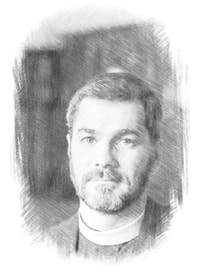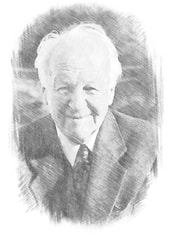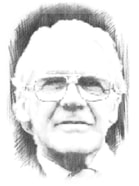Luke 9
|
Luke 9:10-17:
And the apostles, when they had returned, told Him all that they had done. Then He took them and went aside privately into a deserted place belonging to the city called Bethsaida. 11 But when the multitudes knew it, they followed Him; and He received them and spoke to them about the kingdom of God, and healed those who had need of healing. 12 When the day began to wear away, the twelve came and said to Him, “Send the multitude away, that they may go into the surrounding towns and country, and lodge and get provisions; for we are in a deserted place here.” 13 But He said to them, “You give them something to eat.” And they said, “We have no more than five loaves and two fish, unless we go and buy food for all these people.” 14 For there were about five thousand men. Then He said to His disciples, “Make them sit down in groups of fifty.” 15 And they did so, and made them all sit down. 16 Then He took the five loaves and the two fish, and looking up to heaven, He blessed and broke them, and gave them to the disciples to set before the multitude. 17 So they all ate and were filled, and twelve baskets of the leftover fragments were taken up by them. |
Trying to solve the dilemma on their own, the disciples are stymied. Pointing to a young man’s meal pouch of five loaves and two fish, Andrew asks, “How far will they go among so many?” Philip tries to calculate how much it will cost to feed the throng, concluding that not even eight months’ wages would be enough. Some of the apostles urge Jesus to send the crowd home.
Of course, in focusing on what they did not have, the disciples overlooked what they did have: a few pieces of bread, a couple of fish, and, most important of all, the Great Banquet’s executive chef. What they saw as a limitation, Jesus saw as an opportunity. When that young man stepped out from the crowd and offered what he had, Jesus worked a miracle and fed a mountain full of people. And that was just the appetizer; the main course was still to come. After the miracle, Jesus crosses the Sea of Galilee, and the people follow. Invoking the story of Moses, they brazenly order Jesus to serve up more miracle feasts so that they may believe in Him, demanding, “What sign then will you give that we may see it and believe you?” He admonishes them for not recognizing their spiritual emptiness, for their ingratitude, for their sense of entitlement, for their shallowness. “It is not Moses who has given you the bread from heaven, but it is my Father who gives you the true bread from heaven. For the bread of God is the bread that comes down from heaven and gives life to the world.” Their response is stunning: “From now on, give us this bread!” Exasperated, Jesus explains, “I am the bread of life. Whoever comes to me will never go hungry. … The one who feeds on me will live because of me.” He almost begs the crowd to join the feast — the real feast — but they reject His offer as they meander into the night. Some argue about the meaning of His words. Some grumble and question his background. Some reject His “hard teaching,” concluding, “Who can accept it?” According to John, “Many of His disciples turned back and no longer followed him.” Jesus was revealing to the crowd — and to us — not just what we need to survive, but what we need to live. To be truly alive, to experience the abundant life He desires to share with us, we need more than the blessings He gives. We need Him. For those with ears to hear, there’s nothing really new in what Christ said. In fact, this idea that God is the bread of life is the same message shared in Isaiah: “Listen, listen to me, and eat what is good, and you will delight in the richest of fare. Give ear and come to me; listen, that you may live.” Only God can fill an empty heart. And only a willing spirit can partake of the meal He has prepared. --Alan Dowd |
 Joe Pertulla
Joe Pertulla
Even an elementary reading of Scripture would lead us to believe we have missed the point of who Jesus is and what it means to follow Him. In the Gospel of Luke is the discourse between Jesus and Peter. After asking the disciples who the crowds thought He was, Jesus asked, “Who do you say I am?” (Luke 9:20). Peter responded first, and his answer is short, yet revolutionary: “The Christ of God” (Luke 9:20). Whether Peter’s answer substantiates the formation of the papacy is beside the point. The point is that Peter had a revelation; he got it. He did not stumble on his answer by some magical formula or intellectual exercise, but by revelation of the Holy Spirit. The Spirit opened his eyes, and Peter was able to see Jesus for who He was: the Messiah, the Savior King, the Son of the Living God. Certainly the depth of this revelation grew throughout his life, but in that initial moment his worldview began a dramatic shift.
Like Peter, we need a Spirit-birthed revelation when it comes to the question of who is Jesus Christ. Namely because “You are the Christ of God” comes difficult to swallow for us who live in the center of consumer culture, where comfort, material wealth, individualism, and image are among our most important pursuits. It has become a norm to equate a relationship with Christ with a life of financial freedom and prosperity. Furthermore, we have been sold a gospel that links God’s best for us or the sign of God’s blessing with a big paycheck. The marketing strategy of today’s Christology has been handcuffed to a checking account with a large ending balance. Can we really say we know who Christ is when we have dissociated suffering and self-sacrifice from following Christ? Following Christ is by no means a call to masochism, but since when has taking up one’s cross (Luke 9:23) been a call to a life of comfort and luxury?
“You are the Christ of God” leaves no room for narcissism. It implies a total shift in our values, pursuits, and what we deem important in life. It demands we realize the supremacy of Christ in every area of our life. When we do, titles, positions, accolades, degrees, and our greatest achievements pale in comparison with the Light of the World. To respond like Peter means a radical shift takes place within our heart; we move from self to servant. This uprising in the human soul becomes the bedrock of our new identity. In that moment of revelation is complete abandonment to self, total surrender to the person of Jesus Christ, and the emergence of childlike faith in our Lord. It propels us to live a life of love and gives us the courage to follow Christ even if it includes poverty and discomfort. --Joel T. Perttula: Enrichment Journal: Who Do You Say I Am?
Like Peter, we need a Spirit-birthed revelation when it comes to the question of who is Jesus Christ. Namely because “You are the Christ of God” comes difficult to swallow for us who live in the center of consumer culture, where comfort, material wealth, individualism, and image are among our most important pursuits. It has become a norm to equate a relationship with Christ with a life of financial freedom and prosperity. Furthermore, we have been sold a gospel that links God’s best for us or the sign of God’s blessing with a big paycheck. The marketing strategy of today’s Christology has been handcuffed to a checking account with a large ending balance. Can we really say we know who Christ is when we have dissociated suffering and self-sacrifice from following Christ? Following Christ is by no means a call to masochism, but since when has taking up one’s cross (Luke 9:23) been a call to a life of comfort and luxury?
“You are the Christ of God” leaves no room for narcissism. It implies a total shift in our values, pursuits, and what we deem important in life. It demands we realize the supremacy of Christ in every area of our life. When we do, titles, positions, accolades, degrees, and our greatest achievements pale in comparison with the Light of the World. To respond like Peter means a radical shift takes place within our heart; we move from self to servant. This uprising in the human soul becomes the bedrock of our new identity. In that moment of revelation is complete abandonment to self, total surrender to the person of Jesus Christ, and the emergence of childlike faith in our Lord. It propels us to live a life of love and gives us the courage to follow Christ even if it includes poverty and discomfort. --Joel T. Perttula: Enrichment Journal: Who Do You Say I Am?
Luke 9:21-22:
21 And he straitly charged them, and commanded them to tell no man that thing;
22 Saying, The Son of man must suffer many things, and be rejected of the elders and chief priests and scribes, and be slain, and be raised the third day.
21 And he straitly charged them, and commanded them to tell no man that thing;
22 Saying, The Son of man must suffer many things, and be rejected of the elders and chief priests and scribes, and be slain, and be raised the third day.
|
Luke 9:23-26:
And he said to them all, If any man will come after me, let him deny himself, and take up his cross daily, and follow me. 24 For whosoever will save his life shall lose it: but whosoever will lose his life for my sake, the same shall save it. 25 For what is a man advantaged, if he gain the whole world, and lose himself, or be cast away? 26 For whosoever shall be ashamed of me and of my words, of him shall the Son of man be ashamed, when he shall come in his own glory, and in his Father's, and of the holy angels. |
 Barkley S Thompson
Barkley S Thompson
Whatever it may mean to bear the cross of Christ as faithful disciples, it must always be a means by which the world is blessed. If there is a litmus test by which we can judge whether the burden laid upon us is part of our walk of faith, or whether it is laid upon us by God, then that is it, and it is worth saying again: Whatever it may mean to bear the cross of Christ as faithful disciples, it must always be a means by which the world is blessed. Bearing the cross of Christ may include suffering at times—indeed, it will—but only if that suffering is a blessing to someone. Bearing the cross may bring challenge; it may lead to difficult decisions; it may sometimes disrupt relationships; and it will definitely require us to confront powerful forces that can do us harm; but it will only ask such things of us if doing so facilitates God’s blessing upon the world...........The miraculous thing is, when we understand bearing the cross in this way, rather than as some foreboding and myopic walk of doom, we begin to experience intuitively what faith really is. When we bless, we become agents of grace and of God’s own gracious will. That Christian smile ceases to crack like a thin veneer and instead becomes an authentic expression of who we are and who we strive to be in the world. In other words, somewhere in the midst of our cross-bearing—somewhere in the mix of faithfully following God and pursuing grace—we find joy. Joy can reside alongside challenge, or sorrow, or pain, and joy’s presence redeems all these others. Joy renders them ultimately transient, whereas joy is permanent. This is what it means to lose one’s life for the sake of the Gospel and thereby regain it. --Barkley S Thompson; What does it mean to “take up the cross”? 2.28.21
 John Stott
John Stott
“Jesus never concealed the fact that his religion included a demand as well as an offer. Indeed, the demand was as total as the offer was free. If he offered men his salvation, he also demanded their submission. He gave no encouragement whatever to thoughtless applicants for discipleship. He brought no pressure to bear on any inquirer. He sent irresponsible enthusiasts away empty. Luke tells of three men who either volunteered, or were invited, to follow Jesus; but no one passed the Lord’s test. The rich young ruler, too, moral, earnest and attractive, who wanted eternal life on his own terms, went away sorrowful, with his riches intact but with neither life nor Christ as his possession…The Christian landscape is strewn with the wreckage of derelict, half built towers—the ruins of those who began to build and were unable to finish. For thousands of people still ignore Christ’s warning and undertake to follow him without first pausing to reflect on the cost of doing so. The result is the great scandal of Christendom today, so called “nominal Christianity.” In countries to which Christian civilization has spread, large numbers of people have covered themselves with a decent, but thin, veneer of Christianity. They have allowed themselves to become somewhat involved, enough to be respectable but not enough to be uncomfortable. Their religion is a great, soft cushion. It protects them from the hard unpleasantness of life, while changing its place and shape to suit their convenience. No wonder the cynics speak of hypocrites in the church and dismiss religion as escapism…The message of Jesus was very different. He never lowered his standards or modified his conditions to make his call more readily acceptable. He asked his first disciples, and he has asked every disciple since, to give him their thoughtful and total commitment. Nothing less than this will do” ― John R.W. Stott, Basic Christianity
27 But I tell you of a truth, there be some standing here, which shall not taste of death, till they see the kingdom of God.
28 And it came to pass about an eight days after these sayings, he took Peter and John and James, and went up into a mountain to pray.
29 And as he prayed, the fashion of his countenance was altered, and his raiment was white and glistering.
30 And, behold, there talked with him two men, which were Moses and Elias:
31 Who appeared in glory, and spake of his decease which he should accomplish at Jerusalem.
32 But Peter and they that were with him were heavy with sleep: and when they were awake, they saw his glory, and the two men that stood with him.
33 And it came to pass, as they departed from him, Peter said unto Jesus, Master, it is good for us to be here: and let us make three tabernacles; one for thee, and one for Moses, and one for Elias: not knowing what he said.
34 While he thus spake, there came a cloud, and overshadowed them: and they feared as they entered into the cloud.
35 And there came a voice out of the cloud, saying, This is my beloved Son: hear him.
36 And when the voice was past, Jesus was found alone. And they kept it close, and told no man in those days any of those things which they had seen.
37 And it came to pass, that on the next day, when they were come down from the hill, much people met him.
38 And, behold, a man of the company cried out, saying, Master, I beseech thee, look upon my son: for he is mine only child.
39 And, lo, a spirit taketh him, and he suddenly crieth out; and it teareth him that he foameth again, and bruising him hardly departeth from him.
40 And I besought thy disciples to cast him out; and they could not.
41 And Jesus answering said, O faithless and perverse generation, how long shall I be with you, and suffer you? Bring thy son hither.
42 And as he was yet a coming, the devil threw him down, and tare him. And Jesus rebuked the unclean spirit, and healed the child, and delivered him again to his father.
43 And they were all amazed at the mighty power of God. But while they wondered every one at all things which Jesus did, he said unto his disciples,
44 Let these sayings sink down into your ears: for the Son of man shall be delivered into the hands of men.
45 But they understood not this saying, and it was hid from them, that they perceived it not: and they feared to ask him of that saying.
46 Then there arose a reasoning among them, which of them should be greatest.
47 And Jesus, perceiving the thought of their heart, took a child, and set him by him,
48 And said unto them, Whosoever shall receive this child in my name receiveth me: and whosoever shall receive me receiveth him that sent me: for he that is least among you all, the same shall be great.
49 And John answered and said, Master, we saw one casting out devils in thy name; and we forbad him, because he followeth not with us.
50 And Jesus said unto him, Forbid him not: for he that is not against us is for us.
51 And it came to pass, when the time was come that he should be received up, he stedfastly set his face to go to Jerusalem,
52 And sent messengers before his face: and they went, and entered into a village of the Samaritans, to make ready for him.
53 And they did not receive him, because his face was as though he would go to Jerusalem.
54 And when his disciples James and John saw this, they said, Lord, wilt thou that we command fire to come down from heaven, and consume them, even as Elias did?
55 But he turned, and rebuked them, and said, Ye know not what manner of spirit ye are of.
56 For the Son of man is not come to destroy men's lives, but to save them. And they went to another village.
57 And it came to pass, that, as they went in the way, a certain man said unto him, Lord, I will follow thee whithersoever thou goest.
58 And Jesus said unto him, Foxes have holes, and birds of the air have nests; but the Son of man hath not where to lay his head.
59 And he said unto another, Follow me. But he said, Lord, suffer me first to go and bury my father.
60 Jesus said unto him, Let the dead bury their dead: but go thou and preach the kingdom of God.
61 And another also said, Lord, I will follow thee; but let me first go bid them farewell, which are at home at my house.
62 And Jesus said unto him, No man, having put his hand to the plough, and looking back, is fit for the kingdom of God.
28 And it came to pass about an eight days after these sayings, he took Peter and John and James, and went up into a mountain to pray.
29 And as he prayed, the fashion of his countenance was altered, and his raiment was white and glistering.
30 And, behold, there talked with him two men, which were Moses and Elias:
31 Who appeared in glory, and spake of his decease which he should accomplish at Jerusalem.
32 But Peter and they that were with him were heavy with sleep: and when they were awake, they saw his glory, and the two men that stood with him.
33 And it came to pass, as they departed from him, Peter said unto Jesus, Master, it is good for us to be here: and let us make three tabernacles; one for thee, and one for Moses, and one for Elias: not knowing what he said.
34 While he thus spake, there came a cloud, and overshadowed them: and they feared as they entered into the cloud.
35 And there came a voice out of the cloud, saying, This is my beloved Son: hear him.
36 And when the voice was past, Jesus was found alone. And they kept it close, and told no man in those days any of those things which they had seen.
37 And it came to pass, that on the next day, when they were come down from the hill, much people met him.
38 And, behold, a man of the company cried out, saying, Master, I beseech thee, look upon my son: for he is mine only child.
39 And, lo, a spirit taketh him, and he suddenly crieth out; and it teareth him that he foameth again, and bruising him hardly departeth from him.
40 And I besought thy disciples to cast him out; and they could not.
41 And Jesus answering said, O faithless and perverse generation, how long shall I be with you, and suffer you? Bring thy son hither.
42 And as he was yet a coming, the devil threw him down, and tare him. And Jesus rebuked the unclean spirit, and healed the child, and delivered him again to his father.
43 And they were all amazed at the mighty power of God. But while they wondered every one at all things which Jesus did, he said unto his disciples,
44 Let these sayings sink down into your ears: for the Son of man shall be delivered into the hands of men.
45 But they understood not this saying, and it was hid from them, that they perceived it not: and they feared to ask him of that saying.
46 Then there arose a reasoning among them, which of them should be greatest.
47 And Jesus, perceiving the thought of their heart, took a child, and set him by him,
48 And said unto them, Whosoever shall receive this child in my name receiveth me: and whosoever shall receive me receiveth him that sent me: for he that is least among you all, the same shall be great.
49 And John answered and said, Master, we saw one casting out devils in thy name; and we forbad him, because he followeth not with us.
50 And Jesus said unto him, Forbid him not: for he that is not against us is for us.
51 And it came to pass, when the time was come that he should be received up, he stedfastly set his face to go to Jerusalem,
52 And sent messengers before his face: and they went, and entered into a village of the Samaritans, to make ready for him.
53 And they did not receive him, because his face was as though he would go to Jerusalem.
54 And when his disciples James and John saw this, they said, Lord, wilt thou that we command fire to come down from heaven, and consume them, even as Elias did?
55 But he turned, and rebuked them, and said, Ye know not what manner of spirit ye are of.
56 For the Son of man is not come to destroy men's lives, but to save them. And they went to another village.
57 And it came to pass, that, as they went in the way, a certain man said unto him, Lord, I will follow thee whithersoever thou goest.
58 And Jesus said unto him, Foxes have holes, and birds of the air have nests; but the Son of man hath not where to lay his head.
59 And he said unto another, Follow me. But he said, Lord, suffer me first to go and bury my father.
60 Jesus said unto him, Let the dead bury their dead: but go thou and preach the kingdom of God.
61 And another also said, Lord, I will follow thee; but let me first go bid them farewell, which are at home at my house.
62 And Jesus said unto him, No man, having put his hand to the plough, and looking back, is fit for the kingdom of God.










